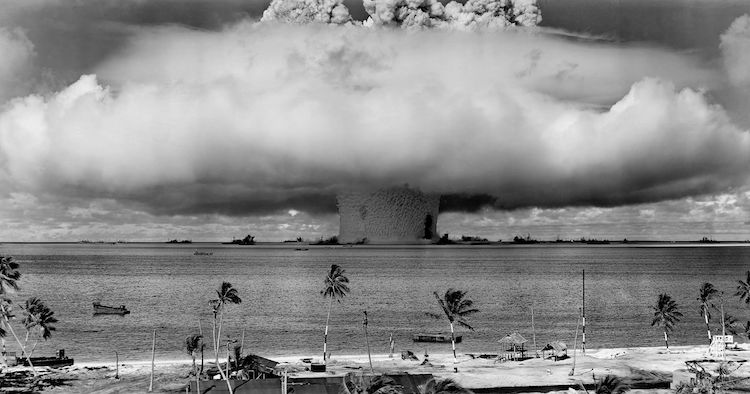By Ramesh Jaura
BERLIN | NEW YORK (IDN) – Amid mounting signs of a new arms race unleashing between the United States and Russia, which together account for 93 percent of the nuclear weapons around the world, a top Trump Administration official has obliquely accused Russia of violating the global ban on nuclear tests enshrined in the 1996 Comprehensive Test Ban Treaty (CTBT).
The allegation comes within days of UN Secretary-General António Guterres’ video message on the anniversary of the launch of his disarmament agenda ‘Securing Our Common Future’, in Geneva on May 24.
The UN chief declared: “Today, the global security environment is threatened from many sides. The international arms‑control architecture is experiencing enormous strains. Regional nuclear challenges persist. And tensions between nuclear-armed rivals have intensified.”
This is underlined by uncertainty threatening the landmark new START Treaty that is going to expire in 2021, and the future of Intermediate-Range Nuclear Forces (INF) agreement hanging fire. President Donald Trump said in February that Washington would start the process of withdrawing from the treaty in six months’ time.
In prepared remarks delivered on May 29 at a Hudson Institute event, Lt. Gen. Robert P. Ashley, Jr., the director of the Defense Intelligence Agency (DIA), stated that “The United States believes that Russia probably is not adhering to its nuclear testing moratorium in a manner consistent with the ‘zero-yield’ standard” outlined in the CTBT, which Russia has signed and ratified.
The United States has signed but not ratified the treaty. There are seven other remaining States that need to ratify the CTBT to achieve its entry into force: China, the DPRK, Egypt, India, Israel, Iran, and Pakistan. Subsequently, the CTBT has been lying limbo for more than two decades.
And this despite the fact, as Executive Secretary Dr Lassina Zerbo maintains, that the Preparatory Commission for the Comprehensive Nuclear-Test-Ban Treaty Organization (CTBTO) is the only organization with the proven competencies and capabilities to provide adequate verification as part of any denuclearization agreement. “The CTBTO and its verification regime can be explicitly called upon to verify this aspect of an agreement.”
Responding to claims of Illegal Russian nuclear testing, the Washington-based Arms Control Association (ACA) says: “Any violation of the CTBT by Russia … would be a serious matter. But when pressed on the allegation in the question and answer session of the event by Wall Street Journal reporter Michael Gordon, [the DIA director] Ashley would only say that Russia had the ‘capability’ to conduct very low-yield supercritical nuclear tests in contravention of the treaty, a capability which Russia, China, and the United States have long had. He did not say that Russia has conducted or is conducting such tests.”
According to CBS News‘ David Martin, “For years, Pentagon officials have been expecting the Russians to violate the treaty, but Wednesday’s [May 29] comments mark the first time the U.S. has explicitly said Moscow has failed to observe its commitments under the CTBT.”
In fact, critics of the agreement, and arms control more broadly, including National Security Adviser John Bolton, have long claimed that the treaty does not properly define a nuclear test, that Russia and China have a different interpretation than the United States of what the treaty prohibits, and that Moscow and Beijing have conducted nuclear tests in violation of the treaty. Bolton previously claimed the CTBT offered “illusionary protections”.
But no public evidence has ever been provided to support the claim of illegal Russian testing and Gen. Ashley didn’t provide any on May 29, the ACA argues. It points out that former Undersecretary of State for Arms Control and International Security Rose Gottemoeller told the House Armed Services Committee in December 2015 that “within this century, the only state that has tested nuclear weapons … in a way that produced a nuclear yield is North Korea”.
“This begs the question of what, if anything, has changed since then that would support a different conclusion,” adds the ACA.
Gen. Ashley also claimed that Russia has “not affirmed the language of zero-yield.” But Russia has repeatedly affirmed publicly that they believe the treaty prohibits all nuclear test explosions. For example, Russian Deputy Foreign Minister Sergey Ryabkov noted in a 2017 op-ed that the treaty “prohibits ‘any nuclear weapon test explosion or any other nuclear explosion,’ anywhere on Earth, whatever the yield.”
The most effective way for the United States to enforce compliance with the zero-yield standard is for the Trump administration and the U.S. Senate to support ratification of the treaty and help to bring it into force, which would allow for intrusive, short-notice, on-site inspections to detect and deter any possible cheating, says the ACA.
“In the meantime, if the U.S. has credible evidence that Russia is violating its CTBT commitments, it should propose, as allowed for in Articles V and VI of the treaty, mutual confidence building visits to the respective U.S. and Russian test sites by technical experts to address concerns about compliance,” the ACA concludes.
Gen. Ashley’s remarks have prompted head of the State Duma Defense Committee Vladimir Shamanov to tell Russia’s state-run Interfax news agency: “The statement of the director of the United States Defense Intelligence Agency (DIA) about Russia’s alleged secret nuclear tests reveals the U.S. military’s declining professionalism.”
Shamanov added that Gen. Ashley “just could not have made a more irresponsible statement. Nuclear tests cannot be carried out secretly with equipment, which is controlling these processes today.” [IDN-InDepthNews – 29 May 2019]
Photo: “Baker Shot”, part of Operation Crossroads, a nuclear test by the United States at Bikini Atoll in 1946. Credit: Wikimedia Commons.
IDN is flagship agency of the International Press Syndicate.
facebook.com/IDN.GoingDeeper – twitter.com/InDepthNews
Send your comment: comment@indepthnews.colo.ba.be
Subscribe to IDN Newsletter: newsletter@indepthnews.colo.ba.be

